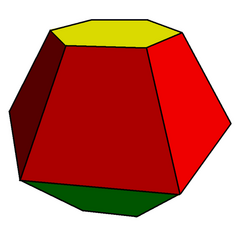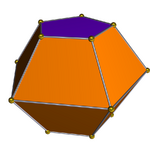Bifrustum
From HandWiki
Revision as of 18:24, 4 August 2021 by imported>PolicyEnforcerIA (attribution)
| Set of bifrusta | |
|---|---|
 Example hexagonal bifrustum | |
| Faces | 2 n-gons, 2n trapezoids |
| Edges | 5n |
| Vertices | 3n |
| Symmetry group | Dnh, [n,2], (*n22) |
| Dual polyhedron | Elongated bipyramids |
| Properties | convex |
An n-agonal bifrustum is a polyhedron composed of three parallel planes of n-agons, with the middle plane largest and usually the top and bottom congruent.
It can be constructed as two congruent frusta combined across a plane of symmetry, and also as a bipyramid with the two polar vertices truncated.
They are duals to the family of elongated bipyramids.
Forms
Three bifrustums are duals to three Johnson solids, J14-16. In general, a n-agonal bifrustum has 2n trapezoids, 2 n-agons, and is dual to the elongated dipyramids.
| Triangular bifrustum | Square bifrustum | Pentagonal bifrustum |
|---|---|---|

|

|

|
| 6 trapezoids, 2 triangles. Dual to elongated triangular bipyramid, J14 | 8 trapezoids, 2 squares. Dual to elongated square bipyramid, J15 | 10 trapezoids, 2 pentagons. Dual to elongated pentagonal bipyramid, J16 |
This article does not cite any external source. HandWiki requires at least one external source. See citing external sources. (2021) (Learn how and when to remove this template message) |
 |

